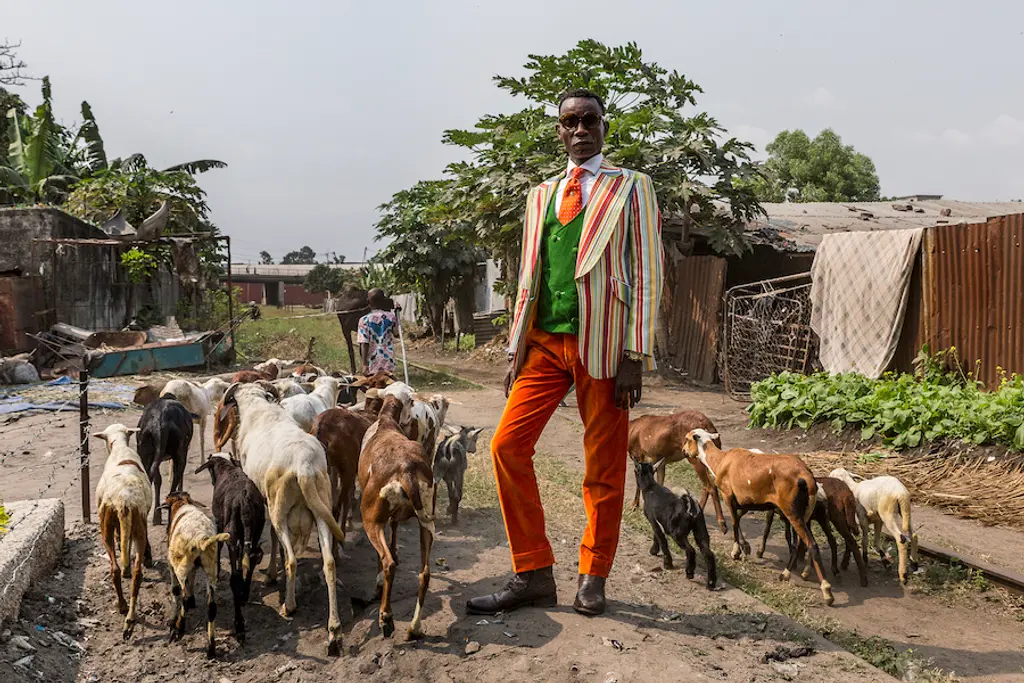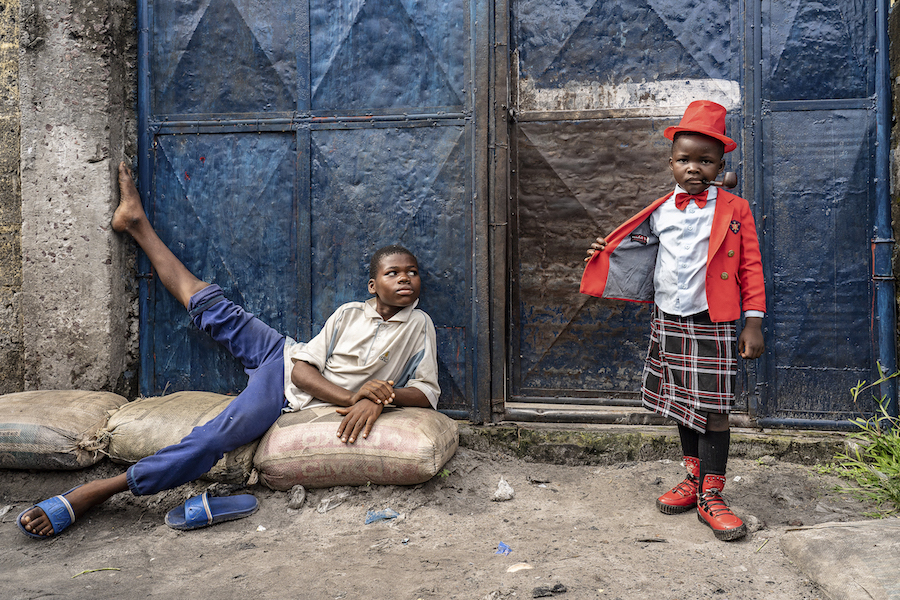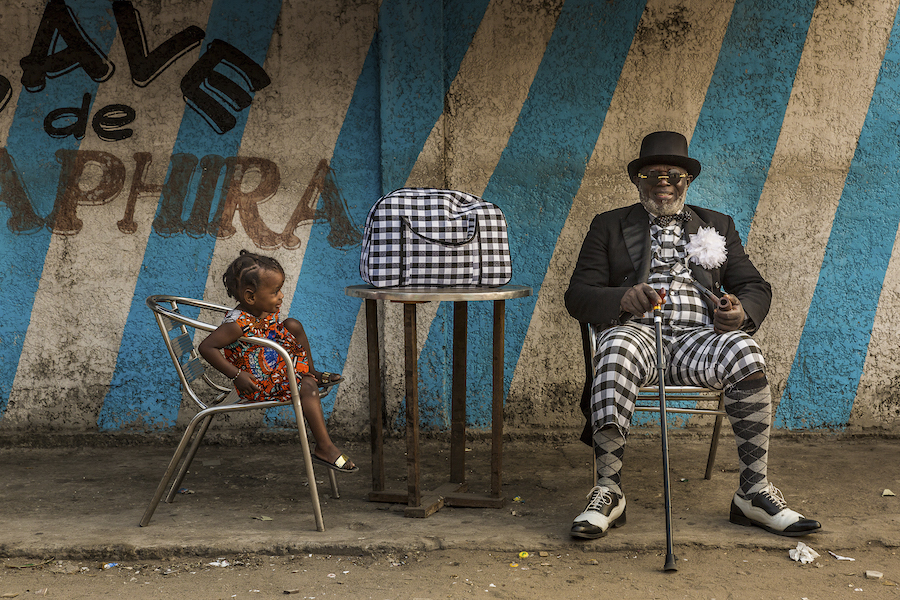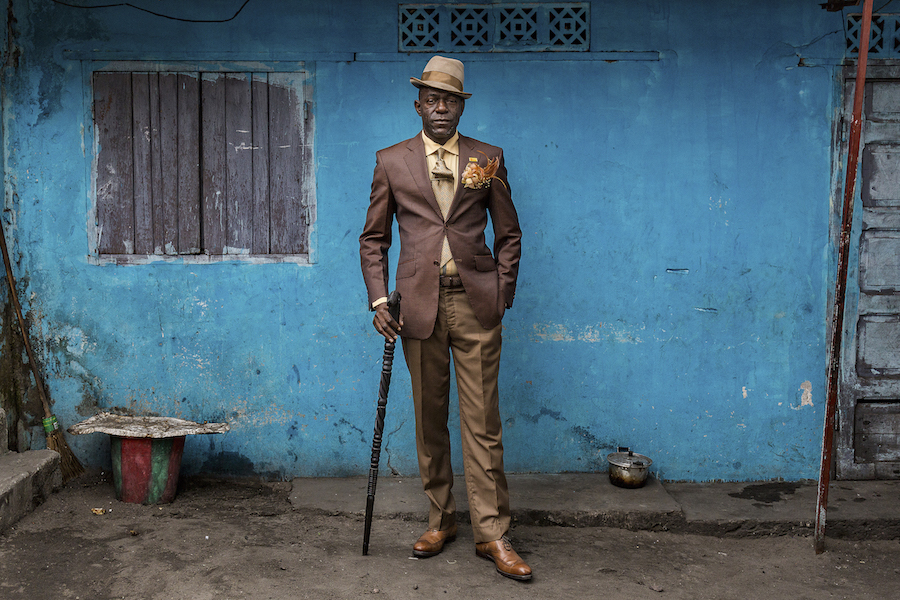The wild style of the men and women of the Congo
- Text by Miss Rosen
- Photography by Tariq Zaidi

After receiving his first camera at the age of 14, Tariq Zaidi dreamed of shooting for National Geographic. “Over the years I used to travel a lot,” he says. “My aim was to see the world, as many places as I could, travelling with a small backpack and just going.”
While traveling from Morocco to South Africa by land in 2013, Zaidi was dazzled by the sight of a Sapeur. Determined to learn more, in 2017, the photographer traveled to Brazzaville and Kinshasa to learn more about the Congolese fashion culture known as La Sape, “Société des Ambianceurs et des Personnes Élégantes” (Society of Ambiance-Makers and Elegant People).
In Sapeurs: Ladies and Gentlemen of the Congo (Kehrer), Zaidi presents a series of stunning environmental portraits and interviews with members of La Sape in both cities. “Congolese people are known for taking pride in their appearance – yet La Sape takes the art of looking good to the next level,” Zaidi says.

Nkodia Aurelie, 48-year-old businesswoman and Sapeuse for 36 years, in Brazzaville, 2019
“Being a Sapeur is about clothes, but it’s also about an attitude and a way of being in the world. It’s telling the world that no matter what my environmental condition is, I am still human, and I still have dreams and aspirations.”
Although most are day labourers, taxi drivers, and gardeners, Sapeurs don dapper designer suits that perfectly match their flamboyant personalities. And while dominated by men, in recent years more women (Sapeuses) and children have joined the scene, which Zaidi discovered by spending time with Sapeurs at home in their communities.
Creating this series posed its own unique set of challenges. Working in 35-40 degree heat, often in 60 per cent humidity, Zaidi was always on the move, walking for miles, fighting traffic, and dealing with visa problems and permits.
“It’s often difficult to get to their communities, which are usually hours away from a main road. They aren’t easy to shoot in either; the residents are often apprehensive of outsiders and security is also an issue. Many Sapeurs don’t own cell phones, so I had to send a scout to let them know I was coming,” Zaidi says.

Israell Mbona, 5-year-old school student and Sapeur for three years, in Kinshasa, 2019
“Most work on Sapeurs is also just in Brazzaville, which is an ‘easier’ city to photograph in than Kinshasa, which is huge, busy and chaotic, and hard to get a visa for. This book has pictures from both cities and shows how the style is different: French-influenced classical in Brazzaville and more flamboyant and eccentric in Kinshasa – where anything goes.”
Popularised by Congolese rumba singer Papa Wemba, Sapologie is about putting together an exquisite look that suits one’s true personality. “Sapeurs are treated as rock stars in their community because they defy their material circumstances, so a lot of the thrill for them is the ‘celebrity’ aspect of it,” Zaidi says.
“But mainly it’s about asserting yourself boldly into the world. Their ideas come from themselves. They are aware of global fashion, but as Papa Wemba once said, ‘White people invented the clothes, but we make an art of it’.”

Francis Okiemi, 14-year-old school student and Sapeur for three years, and Steven Okiemi, 9-year-old school student and Sapeur for one year, in Brazzaville, 2019

Ntsimba Marie Jeanne, 52-year-old businesswoman and Sapeuse for 20 years, Okili Nkoressa,10-year-old school student and sapeur for 5 years, and Judith Nkoressa, 39-year-old policewoman and sapeuse for 18 years, in Brazzaville, 2017

Elie Fontaine Nsassoni, 45-year-old taxi owner and Sapeur for 35 years, in Brazzaville, 2017

Yamea Bansimba Jean Claude, 58-year-old bricklayer and Sapeur for 50 years, in Brazzaville, 2017

Clementine Biniakoulou, 52-year-old housewife and Sapeuse for 36 years, in Brazzaville, 2017

Ella Kiadi, 44-year-old businesswoman and Sapeuse for eight years, in Brazzaville, 2019

Basile Gandzion, 51-year-old human resources manager and Sapeur for 30 years, in Brazzaville, 2017
Sapeurs: Ladies and Gentlemen of the Congo is available now on Kehrer.
See more of Tariq Zaidi’s work on his Instagram.
Follow Miss Rosen on Twitter.
Enjoyed this article? Like Huck on Facebook or follow us on Twitter.
Latest on Huck

Plestia Alaqad: “Journalists should focus on humanising people”
Huck’s April interview — Having become one of the most crucial and followed voices from inside Gaza in the aftermath of October 7, the award-winning author and journalist is releasing a new memoir, ‘The Eyes of Gaza’, collating diary entries made over the past 18 months. We caught up with her to hear more about it.
Written by: Isaac Muk

The instrument makers taking DIY music to a whole new level
What does it take to construct a modular synth? How do you turn a block of wood into a double bass? Here, four craftspeople explain why they chose to rip up the rulebooks and build their own music-making machines.
Written by: Daniel Dylan Wray

Southbank Centre reveals new series dedicated to East and Southeast Asian arts
ESEA Encounters — Taking place between 17-20 July, there will be a live concert from YMO’s Haruomi Hosono, as well as discussions around Asian literature, stage productions, and a pop-up Japanese Yokimono summer market.
Written by: Zahra Onsori

In 1971, Pink Narcissus redefined queer eroticism
Camp classic — A new restoration of James Bidgood’s cult film is showing in US theatres this spring. We revisit its boundary pushing aesthetics, as well as its enduring legacy.
Written by: Miss Rosen

As amapiano goes global, where does it leave its roots?
Rainbow grooves — Over the past decade, the house music subgenre has exploded into a worldwide phenomenon. Jak Hutchcraft went to its birthplace of Mamelodi, South Africa, to explore its still-thriving local scene.
Written by: Jak Hutchcraft

Clubbing is good for your health, according to neuroscientists
We Become One — A new documentary explores the positive effects that dance music and shared musical experiences can have on the human brain.
Written by: Zahra Onsori